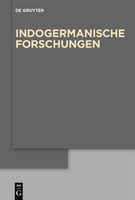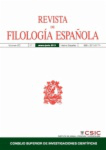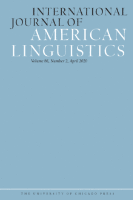
GLOTTA-ZEITSCHRIFT FUR GRIECHISCHE UND LATEINISCHE SPRACHE
metrics 2024
Exploring the Depths of Ancient Linguistics
Introduction
GLOTTA-ZEITSCHRIFT FUR GRIECHISCHE UND LATEINISCHE SPRACHE, published by Vandenhoeck & Ruprecht GmbH & Co KG, stands as a pivotal academic journal within the field of Classics and Linguistics, demonstrating a strong commitment to advancing scholarly discourse surrounding the Greek and Latin languages. With a respectable Scopus ranking placing it in the top 77th percentile for Classics, this journal facilitates the dissemination of high-quality research and insights relevant to linguists, philologists, and historians alike. The journal operates without an open access model, ensuring its niche scholarship remains exclusive yet profoundly impactful. The HIndex is indicative of its longstanding influence, with the journal traces its roots back to its inception, with weighted contributions across several pivotal years. Furthermore, the journal's current standing—positioned in the Q2 quartile for Classics and Q3 quartile for Linguistics—reflects its thriving relevance and aspiration towards academic excellence, offering a significant platform for the exchange of ideas within the global scholarly community. Researchers, professionals, and students are encouraged to engage with the journal's contributions, as it consistently reflects the evolving dialogue in the study of ancient languages.
Metrics 2024
 0.12
0.12 0.10
0.10 0.20
0.20 10
10Metrics History
Rank 2024
Scopus
JCI (Web Of Science)
Quartile History
Similar Journals

Eikasmos-Quaderni Bolognesi di Filologia Classica
Unveiling the Rich Tapestry of Linguistic HeritageEikasmos-Quaderni Bolognesi di Filologia Classica is a distinguished journal that focuses on the fields of Classics, Linguistics, and Language, published by PATRON EDITORE S R L in Italy. With its ISSN 1121-8819, the journal has been a vital platform for the dissemination of scholarly work from 2011 until 2021, contributing significantly to the dialogue within these disciplines. Although recognized in the lower quartiles (Q4) of various categories within Scopus, including Classics and Linguistics, and having ranked in the 37th and 19th percentiles respectively, Eikasmos stands as an invaluable resource for researchers, academics, and students committed to exploring classical philology and its interconnections with modern linguistic studies. The absence of an open access model underscores the importance of institutional support in accessing this scholarly work, which continues to enrich the academic landscape of classical studies.

LATOMUS
Cultivating Insightful Research in the ClassicsLATOMUS is a distinguished academic journal published by Peeters in Belgium, offering a rich platform for scholarly discourse in the fields of Classics, Archaeology, History, Literature, and Linguistics. With the ISSN 0023-8856 and E-ISSN 2294-4427, it has established itself as an essential resource for researchers and professionals seeking to contribute to and engage with critical debates within these disciplines. While not an Open Access journal, LATOMUS is recognized for its robust impact in the academic community, achieving Q2 and Q3 rankings across various categories, including Classics and Archaeology, according to the latest 2023 evaluations. The journal publishes articles that span a range of topics relevant to antiquity and its influences, making it a vital resource for those exploring historical narratives and linguistic developments. As a publication dedicated to advancing scholarly knowledge since its inception in 1971, LATOMUS continues to serve as a cornerstone of academic inquiry within the humanities, promoting intellectual engagement and disseminating high-quality research in its converged years from 1971 to 1974, 1980, and from 2002 to the present.

Sibirskii Filologicheskii Zhurnal
Navigating the Rich Tapestry of Literature and LinguisticsSibirskii Filologicheskii Zhurnal is a prestigious academic journal published by the Russian Academy of Sciences, Institute of Cytology and Genetics. With ISSN 1813-7083, it is dedicated to advancing research in the fields of Cultural Studies, Linguistics and Language, and Literature and Literary Theory, and has achieved notable rankings, including Q2 in Cultural Studies and Linguistics, and Q1 in Literature for 2023. The journal provides a platform for scholarly discourse, contributing valuable insights to its fields with an evolving scope that spans from 2018 to 2024. Though not an open-access journal, Sibirskii Filologicheskii Zhurnal serves as a vital resource for researchers, professionals, and students in the Russian Federation and beyond, fostering a deeper understanding of linguistic and literary phenomena. Its commitment to high-quality content makes it an essential addition to any academic's library.

INDOGERMANISCHE FORSCHUNGEN
Advancing Scholarship in Historical Language StudiesINDOGERMANISCHE FORSCHUNGEN is a prominent academic journal, published by WALTER DE GRUYTER GMBH, focused on the field of linguistics and language studies. With an impressive history that dates back to 1892, this journal has been a vital resource for researchers and professionals exploring the intricacies of Indo-European languages. Although it does not offer open access, its comprehensive and rigorous articles—published in both print (ISSN: 0019-7262) and electronic formats (E-ISSN: 1613-0405)—are instrumental for anyone delving into historical linguistics and comparative studies. The journal currently holds a Q3 ranking in Linguistics and Language, indicating its significance within the academic community, as evidenced by its Scopus rankings in both the Arts and Humanities and Social Sciences domains. Spanning decades of scholarship, INDOGERMANISCHE FORSCHUNGEN plays a pivotal role in advancing the study of language and is essential for scholars aiming to contribute to the dialogue in this ever-evolving discipline.

REVISTA DE FILOLOGIA ESPANOLA
Redefining the Boundaries of Spanish Philological StudiesREVISTA DE FILOLOGIA ESPANOLA is a distinguished academic journal dedicated to the fields of linguistics and literature, published by the CONSEJO SUPERIOR INVESTIGACIONES CIENTIFICAS (CSIC) since 1954, and has been an Open Access journal since its inception. Situated in Madrid, Spain, this journal has emerged as a crucial platform for the dissemination of scholarly research, with notable rankings including Q2 in Linguistics and Language and Q1 in Literature and Literary Theory as of 2023. The journal's commitment to fostering academic dialogue is reflected in its impressive Scopus rankings, including a 79th percentile in the Arts and Humanities for Literature and Literary Theory. Covering a wide range of topics from linguistic theory to literary critique, REVISTA DE FILOLOGIA ESPANOLA is essential reading for researchers, professionals, and students alike, providing valuable insights and cutting-edge research in the ever-evolving landscape of Spanish philology.

Caplletra
Empowering Research and Discourse in Language StudiesCaplletra is a distinguished open-access journal dedicated to the field of linguistics and language studies, published by PUBL ABADIA MONTSERRAT since its inception. Based in Barcelona, Spain, this journal has been a vital resource for researchers, professionals, and students engaged in the intricate explorations of language and its applications since its transition to open access in 2005. Despite its current quartile ranking of Q4 within the Linguistics and Language category as of 2023, Caplletra continues to serve as an inclusive platform, fostering a dialogue that encourages a diverse range of scholarly contributions. Covering an expansive scope in the converged years from 2018 to 2024, it plays a crucial role in disseminating innovative research and insights. With its ISSN 0214-8188 and E-ISSN 2386-7159, Caplletra is committed to making academic work accessible to all, enhancing the landscape of linguistic scholarship and reflecting the evolving nature of language studies.

Studi e Saggi Linguistici
Empowering Linguistic Scholarship for a Global AudienceStudi e Saggi Linguistici is a distinguished academic journal published by EDIZIONI ETS, based in Pisa, Italy. With its ISSN 0085-6827, this journal has established itself as a vital resource in the field of linguistics, particularly noted for its contributions since its inception in 2016. Although currently categorized in the lower quartile (Q4) by the 2023 metrics in the domains of Linguistics and Language within Scopus, it remains a significant platform for innovative research and critical discussions surrounding language studies. Focusing on both theoretical and practical aspects of linguistics, the journal serves as a nexus for scholars and practitioners alike, facilitating a rich interchange of ideas and knowledge in a rapidly evolving discipline. As an invaluable publication for researchers, professionals, and students, Studi e Saggi Linguistici is committed to advancing the understanding of linguistic phenomena and fostering scholarly communication in its field.

AEVUM-RASSEGNA DI SCIENZE STORICHE LINGUISTICHE E FILOLOGICHE
Exploring the Nexus of Language and Culture.AEVUM-RASSEGNA DI SCIENZE STORICHE LINGUISTICHE E FILOLOGICHE is a distinguished academic journal published by VITA PENSIERO, based in Italy, focusing on the intricate fields of historical linguistics, philology, and cultural studies. With ISSN 0001-9593 and E-ISSN 1827-787X, it has been a significant contributor to scholarly discourse since its inception in 1979, with publications dating from 2001 to 2020 and from 2022 to 2023. Although it is categorized in Quartile Q4 across various disciplines including History, Linguistics, Literature, and Philosophy for the year 2023, AEVUM serves as a vital platform for nurturing discourse and advancing research in its fields, particularly appealing to scholars and professionals seeking to explore the intersections of language and culture. While the journal is not open access, it continues to maintain academic rigor and relevance, encouraging contributions that reflect current trends and theoretical developments. Researchers and students alike can benefit from its rich repository of language and historical research, drawing connections that contribute to a profound understanding of human society through the lens of language.

INTERNATIONAL JOURNAL OF AMERICAN LINGUISTICS
Advancing the Frontiers of American Linguistics.The INTERNATIONAL JOURNAL OF AMERICAN LINGUISTICS, published by University of Chicago Press, is a revered scholarly publication dedicated to the exploration and advancement of linguistic studies, particularly those related to the American linguistic landscape. With an ISSN of 0020-7071 and an E-ISSN of 1545-7001, this journal serves as a vital platform for researchers, professionals, and students interested in the nuances of language, dialects, and linguistic structures through rigorous academic inquiry. The journal has established a commendable impact, reflected in its ranking within the Q2 category in Linguistics and Language and its placements in the Scopus rankings, thereby positioning itself within the 50th to 53rd percentile of its respective fields. While the journal does not provide Open Access options, it continues to be a cornerstone resource for those seeking to expand their understanding of American linguistics, already converging from 1996 to 2024. Through its continued commitment to excellence, this publication remains essential for those aiming to contribute significantly to the field.

Rivista di Filologia e di Istruzione Classica
Cultivating Understanding in Humanities through ClassicsRivista di Filologia e di Istruzione Classica is a distinguished academic journal published by LOESCHER EDITORE, dedicated to advancing the fields of Classics and Linguistics. Based in Italy, this journal serves as a vital platform for original research, critical analysis, and scholarly discussions that enrich our understanding of classical texts and educational methodologies in the humanities. With its unique focus on the intricate relationship between classical literature and language, the journal aims to facilitate discourse among researchers, educators, and students alike. Although categorized in the fourth quartile in both Classics and Linguistics, it provides an essential venue for scholars seeking to disseminate their findings and engage with contemporary academic debates. The journal is indexed in various databases, though recent coverage in Scopus has been discontinued. Researchers interested in exploring the complex layers of classical philology and instructional practices are encouraged to contribute to and engage with the innovative scholarship presented in this journal.